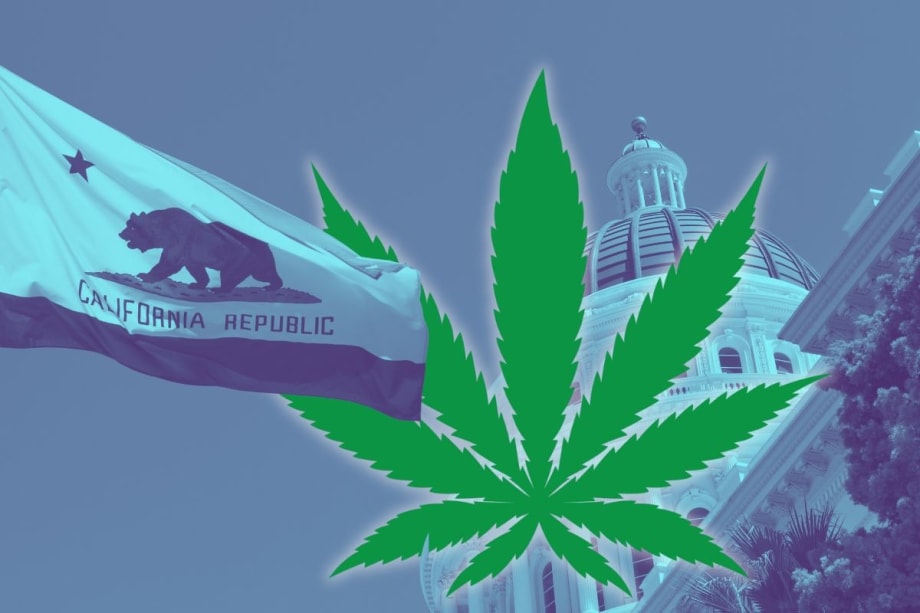Under a new California law, AB 2188, law enforcement officers are among workers who are protected against employer discipline or termination for using marijuana. Under the law, effective Jan. 1, departments cannot take any action against officers for using marijuana while off duty.
Impact of California Law Legalizing Off-Duty Marijuana Use for Cops
Under a new California law, AB 2188, law enforcement officers are among workers who are protected against employer discipline or termination for using marijuana. But there are times when the new law could conflict with the 1968 Gun Control Act.

A California law enacted earlier this year specifies officers cannot be punished if they use marijuana while off duty.
Canva/POLICE Illustration
The law does not protect employees working in the construction and building industries and those hired for positions that require federal background and clearance checks. But, there was no such exemption made for law enforcement officers.
AB 2188 does not permit employees to possess, to be impaired by, or to use, cannabis on the job. Also, it does not restrict the rights or obligations of an employer to maintain a drug- and alcohol-free workplace, if so desired.
While on the federal level marijuana is still an illegal scheduled narcotic, according to workplace safety and compliance services provider DISA Global Solutions, currently 24 states have legalized recreational marijuana use.
Worker Protection for Cannabis Use
The California law makes it “Unlawful for an employer to discriminate against a person in hiring, termination, or any term or condition of employment, or otherwise penalize a person, if the discrimination is based upon the person’s use of cannabis off the job and away from the workplace, except for pre-employment drug screening, as specified, or upon an employer-required drug screening test that has found the person to have non-psychoactive cannabis metabolites in their hair, blood, urine, or other bodily fluids.”
Non-psychoactive cannabis metabolites, according to the California Labor and Employment Law Blog, are the components that are stored in the body after the THC is metabolized and simply indicate that marijuana has been consumed sometime in recent weeks.
"Law enforcement agencies must now ensure that all marijuana testing of employees can identify non-psychoactive metabolites which raises concerns about the accuracy of this type of drug test,” says Geoff Sheldon, public safety attorney with Liebert Cassidy Whitmore. “Too, this legislation now conflicts with the federal Gun Control Act of 1968 which prohibits any person who uses a firearm from being under the influence of a controlled substance, and no real solutions for agencies.”
Fair Employment and Housing Act
The new law is now contained within the California Fair Employment and Housing Act, a state law that protects and safeguards the right and opportunity of all persons to “seek, obtain, and hold employment without discrimination, abridgment, or harassment on account of race, religious creed, color, national origin, ancestry, physical disability, mental disability, medical condition, genetic information, marital status, sex, gender, gender identity, gender expression, age, sexual orientation, or military and veteran status.”
“It's the same law that prohibits discrimination based on race, gender, disability, religion, gender identity, and things of that nature, and now off-duty cannabis use as a protected class. When it passed this law, the legislature carved out an exemption for the construction trades, but ironically, not for police, not for fire, or other public safety departments,” Sheldon says. “And so as best we can tell, it was intended to apply to law enforcement.”
Noting that his firm represents the management in about 75% of law enforcement organizations in the state, Sheldon says agencies initially looked at the new law with disbelief but now are looking at it with clear eyes and seeking advice about compliance with AB 2188. He says in some ways they have previously faced similar situations related to laws that conflicted with departmental policies about facial hair and tattoos.
He says departments are weighing their actions, compliance or not, against the backdrop of potential lawsuits if they do not comply with the new labor law. In California, someone who files a lawsuit on something like this could be awarded damages and attorneys’ fees if they win.
The legislature did make some exemptions, even for law enforcement, in situations where the law would interfere with federal obligations, notes Sheldon. However, the legislature didn't make an exemption that would allow an agency to adhere to a departmental policy that prohibits cannabis use by officers when they are off duty.
Gun Control Act
According to the attorney, an officer who uses marijuana could run afoul of federal firearms laws in certain situations.
Sheldon says the Gun Control Act states that a person cannot use a firearm if they're a marijuana user, but there's an exception that says that they can use marijuana if the gun is issued by a public agency, and it's for use in the public agency.
So, he explains if departments issue guns to their officers, then a department probably could not prohibit off-duty marijuana use under the Gun Control Act. But, what about departments where officers purchase their own weapons?
“That's a scenario where perhaps they could continue to say you cannot use off-duty marijuana,” said Sheldon. “I think the trends, and reading the tea leaves, and seeing where the direction of the country is probably headed with respect to marijuana, I think most chiefs are going to lean towards complying with the new state law and permitting off-duty cannabis.”
Off-Duty Carry
What happens now when a California officer carries off duty if they are carrying a firearm not issued by the department?
“They're going to be in violation of the Gun Control Act and a department can prohibit them from carrying a weapon off duty, theoretically, because if they violate the Gun Control Act there's going to be implications for their employment with the department.”
His advice is that if officers want to carry a non-department-issued firearm while off duty, as he suggests most commonly will do, then they should not be using marijuana.
Long-term Considerations
Although Sheldon admits nobody can really predict the future when talking about any topic, he does think that eventually off-duty marijuana use will be permitted by most if not all agencies.
“I think this is probably the trend of the county. In looking at just the whole issue of marijuana use in our country nationally, I think at some point it is going to be legalized at the federal level and just a matter of when not if,” Sheldon adds.
More Command

Why Police Leaders Must Champion Parking Enforcement
For police and transportation departments, traditional parking enforcement exposes officers to risk, such as standing on busy roads to issue paper tickets or catching offenders in dangerous, congested areas. Modern technology changes this, reducing exposure, speeding processes, and limiting confrontations.
Read More →
More IACP 2025 From the Show Floor
Watch expanded coverage of IACP 2025 as the POLICE Magazine team walks the aisles at the expo and shares what we found interesting on display for chiefs from across the country and around the world this week in Denver, Colorado.
Read More →
IACP 2025 - From the Show Floor
Take a look inside the expo at IACP 2025 to see a sampling of what is displayed for chiefs from across the country and around the world this week in Denver, Colorado.
Read More →
Pro-gard Expands Law Enforcement Vehicle Protection and Transport Solutions
Pro-gard has introduced HD Fender and Headlight Wraps for added front-end protection and a new P1300 Pro-Cell transport system for Ford F-150 and Super Duty models.
Read More →
COPS Teams With The Wounded Blue To Help Injured And Disabled Law Enforcement Officers And Their Families
Free officer-wellness training comes to Las Vegas Sept. 22–25: The Wounded Blue’s 5th Annual National Law Enforcement Survival Summit opens registration.
Read More →
Video: Officer Crawls Across Ladder to Rescue Family from Floodwaters
When floodwaters overturned a vehicle in rural New Mexico, Officer Walker Eby risked his life—crawling over raging currents on a ladder—to rescue a woman, her child, and their dog.
Read More →
Ahmedabad, India, to Host 2029 World Police & Fire Games
Birmingham, Alabama, hosted the 2025 World Police & Fire Games, and Ahmedabad, India, has been announced as the host city for 2029.
Read More →
Trump Calls Out National Guard to Address D.C. Crime
The memorandum says D.C. is a Federal city and violent crime “prevents Federal workers from safely performing their duties and prevents Americans from safely accessing their elected officials.”
Read More →
Atlanta Police Introduce New Uniforms for 2026 World Cup
Chief Darin Schierbaum said the new uniforms are made of a lightweight fabric with four-way stretch, UV protection, and ventilation to make officers more comfortable in the Atlanta heat.
Read More →


